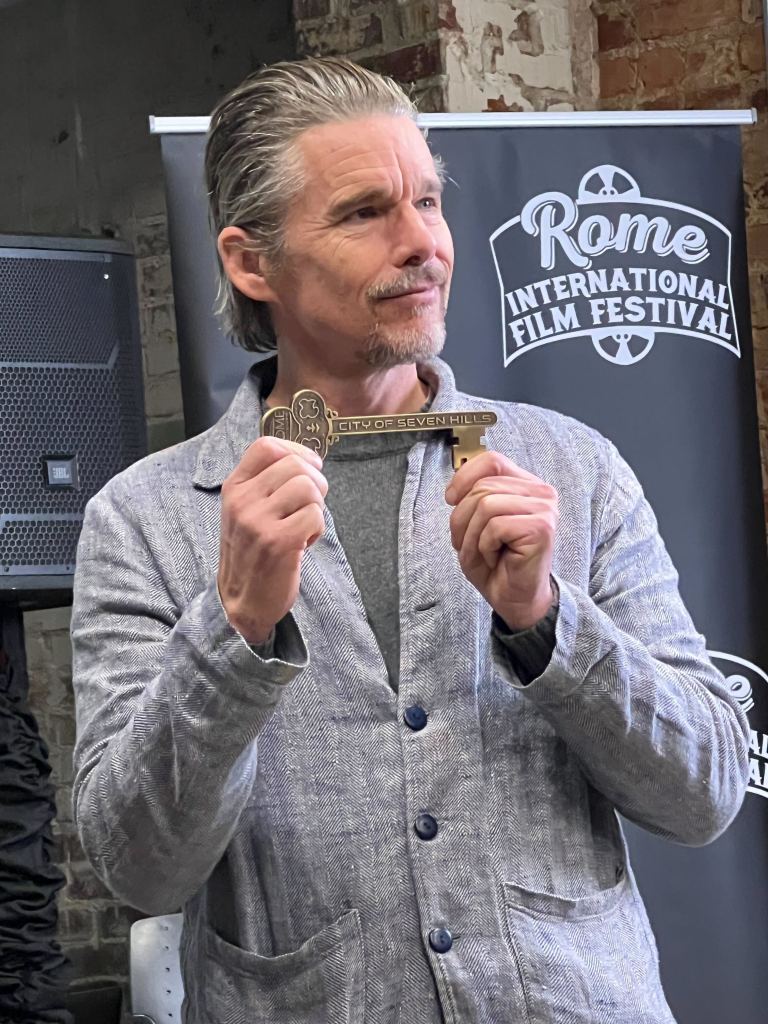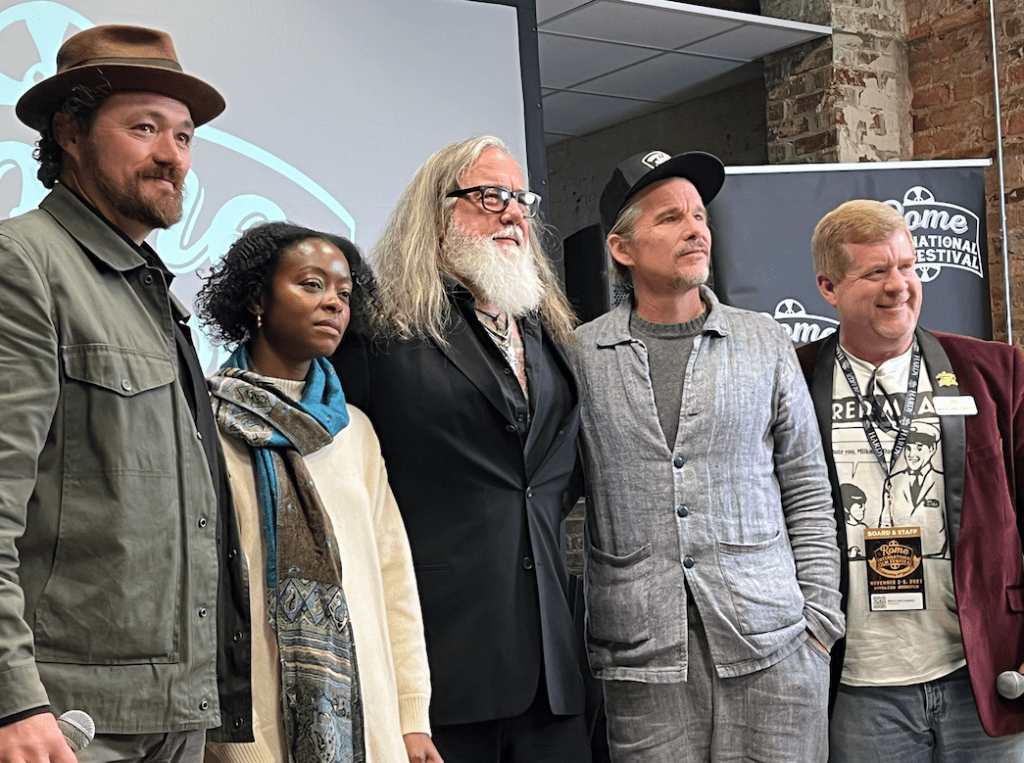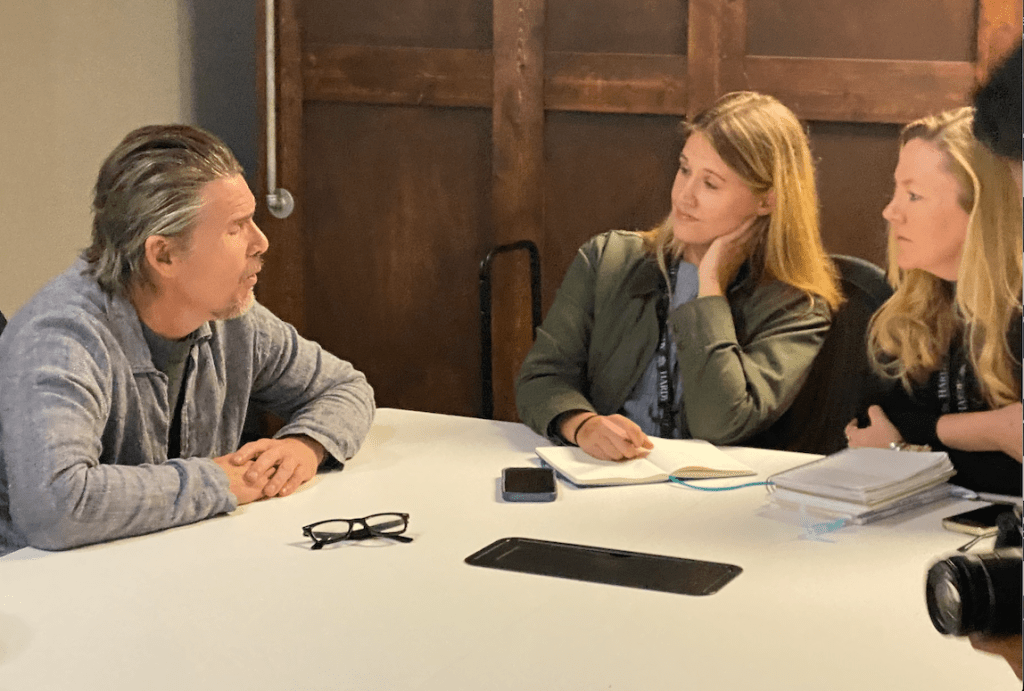
This year’s Rome International Film Festival is kicking off with a screening of “Wildcat,” a new film about Georgia author Flannery O’Connor and her struggle to publish her first novel, “Wise Blood.”
Ethan Hawke directed and co-wrote the film, which stars his daughter Maya Hawke as O’Connor. Friday before the Rome premiere of the film, Hawke sat down with actress Danielle Deadwyler (“Station Eleven,” “Till”) and Rome International Film Festival consultant Michael Dunaway to discuss the making of the film.
But – as often seems to happen with Hawke, who has a real intellectual and artistic curiosity – the conversation evolved into something much deeper, about spirituality, the importance of difficult conversations about race and gender, and how the South in particular is a fertile ground for those conversations. “America is very alive here,” he said in response to Deadwyler’s question about why he’s interested in telling southern stories – alive in its sins and in its beauty.
O’Connor wrote with a cutting pen about white hypocrisy – her short story “Everything That Rises Must Converge,” about a young man named Julian reckoning with his mother’s racism on a bus trip – came up quite a bit in the conversation. But in 2020 amid our nation’s reckoning with racism, numerous articles shed light on O’Connor’s own bigotry. For Hawke, who said he came to O’Connor as a young, emerging feminist, and for Maya, who he said was drawn to O’Connor’s insecurity and ambition, that reckoning opened up a question of how they should approach those aspects of her life.
“I started thinking, the only reason not to is because I was scared to have this conversation with you today,” he said to Deadwyler.
We sat down with Hawke to talk about “Wildcat.” This interview has been lightly edited for length and clarity.

Sammie Purcell: I work creatively with my father, and you said Maya brought the idea of doing this movie to you. Before that happened, had you considered the prospect of working with her? How was that collaboration?
Ethan Hawke: I just felt like I’ve been working with her since she was about four years old. Yeah, really. You can’t be near Maya and not engage in serious conversations about art or music or anything. She’s about the most fun person there is to go see a basketball game with or go to a museum with. The way she looks at the world I’ve always found infinitely fascinating and so actually formally working together felt incredibly natural. Everybody kept asking us, “Aren’t you scared to work with [each other] and we’d turn to each other, “Should we be?” It really didn’t occur to us. It felt easy.
SP: That’s lovely. You mentioned that your mom was the person who introduced you to Flannery O’Connor. I think about all the stuff that my parents shared with me and how that shaped who I am. How have you been approaching that with your kids?
Hawke: Whatever we get given as a child we think is internationally famous and everyone’s being given it. You know, I thought Flannery was as famous as Hemingway. I mean, she was talked about more in my house, so. I don’t know, you know – I mean, maybe I should put more thought into it, but in general, I think no matter what you say or try to do, your example is what you’re really doing. You know, you can say read this or don’t lie or don’t smoke, but if you’re lying and you’re smoking and you’re not reading it, then they see that too, you know? I’m always surprised at what my kids pick up on. I’m like, “Oh, you got that from me? I didn’t know I thought that.”
Julie E. Bloemeke: Action as a form of prayer.
Hawke: Yeah, yeah, exactly. Yeah.
SP: You mentioned that Flannery didn’t like when people looked down on other people, but then in that same breath in her story “Everything that Rises Must Converge,” she sort of serves as a parallel to the Julian character, who holds himself to a higher standard than his mother. When you’re writing, how do you make sense of those contradictions?
Hawke: Well, it just shows a certain amount of wisdom to know that people can be more than one thing. In some aspects, they’re honest, in some aspects, they’re dishonest and she looked in the mirror as hard as she looked at other people, but she was always seeing the difference between what people presented and what they thought. There’s a great example of it in her story “Revelation” where a woman is walking into a doctor’s office and she’s presenting like the nicest person in the world, [but] what she’s really doing is looking at everyone and grading them on the status ladder of mankind: “I’m better than her, not as good as her.” I think so many of us involuntarily do that.
JB: I was particularly interested in your comments earlier about acts of worship–art being an act of worship. I’m wondering, with the spiritual discernment it seems like you’re going through at the moment, how’s that affecting your next set of projects?
Hawke: I mean, I think I’m just kind of getting cognizant to something I’ve always been thinking about, about what choices I make and why. And ultimately, I think all of us do our best to follow our heart, right? I mean, you want to, we all need to make a living and we need to pay our bills, and we make some decisions based on that. It’s a funny time to get asked that question, because the strike has been going on so long and it’s the first time in a long time I don’t know what I’m doing. You know, the whole business is kind of off the treadmill. And so I’ll be really interested to see what I do next because I really – it’s the first time in a long time I have no idea.
SP: Does that uncertainty scare you, or make you feel a certain type of way?
Hawke: I distract myself with work a lot. So it makes you slightly apprehensive. It was fun to have this project, “Wildcat,” to be working on, and whenever you finish something, there’s this looking ahead of like, well, where to engage, where do I put my energy now? I’m jealous of people who have a job that they get promoted to, and when they do a good job, like you know where – I never know where I’m going to be next year. You know, you find yourself in Spain making a movie with [Spanish director Pedro] Almodóvar, and you don’t really know how. I didn’t see that coming, you know? And I don’t know what the coming years will be either. I know there are certain things I’m looking at. It’s been a long time since I’ve been on stage, and I’d really like to make that happen. I really enjoyed directing this movie. I can imagine that the next 25 years of my life might have more of that. You know, being the lead of movies is somewhat a young person’s game, you know? So you start to explore all your other interests.
SP: Yeah, that Almodóvar movie was great, by the way.
Hawke: Oh, thanks.
JB: I’m a huge fan of the “Before” trilogy, but one of the things that I noticed throughout your work is there’s an element of serendipity. So I’m wondering if you could talk about any serendipitous moments that you had on set that you’d be willing to share?
Hawke: So many, I mean, there’s always something odd when you’re dealing with a real person. You know, you can’t help but imagine what they would think about what you’re doing or you meet people that met her. I mean, it’s obvious we’re not making a documentary. We’re making a work of art based on our reaction to her work. You know, so it’s not her. But I always felt, you know, anytime that peacocks misbehaved, I always felt that she was speaking to us in some way.
JB: I love that. That seems very Flannery. What is your hope in how people might respond to this film?
Hawke: Well, what you always hope is that everybody drops what they’re doing and worships it for the rest of their lives. [laughter] You know? But in general, I try not to have those kinds of hopes. Like-minded people understand what you’re going for. My favorite movies are movies where you can tell somebody wasn’t trying to please you. They were trying to express themselves. Those are my favorite kind of movies. And then you just have to let the chips fall where they may about who is like-minded. So, you know, besides wanting everybody to love it more than they love their own children, I don’t have any aspirations. [laughter]
SP: Well, thank you so much again for speaking with us. This is the last one I have. But I just wondered – this has been playing the festival circuit. Has it gotten picked up anywhere?
Hawke: I have a Zoom call when I leave this interview, where we’re trying to figure out exactly what – it’s a big [decision], who distributes your movie and where. So we’re trying to make a good decision.

